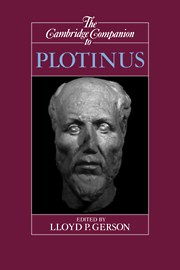Book contents
- Frontmatter
- Introduction
- 1 Plotinus
- 2 Plotinus's metaphysics of the One
- 3 The hierarchical ordering of reality in Plotinus
- 4 On soul and intellect
- 5 Essence and existence in the Enneads
- 6 Plotinus on the nature of physical reality
- 7 Plotinus on matter and evil
- 8 Eternity and time
- 9 Cognition and its object
- 10 Self-knowledge and subjectivity in the Enneads
- 11 Plotinus
- 12 Human freedom in the thought of Plotinus
- 13 An ethic for the late antique sage
- 14 Plotinus and language
- 15 Plotinus and later Platonic philosophers on the causality of the First Principle
- 16 Plotinus and Christian philosophy
- Bibliography
- Index
5 - Essence and existence in the Enneads
Published online by Cambridge University Press: 28 May 2006
- Frontmatter
- Introduction
- 1 Plotinus
- 2 Plotinus's metaphysics of the One
- 3 The hierarchical ordering of reality in Plotinus
- 4 On soul and intellect
- 5 Essence and existence in the Enneads
- 6 Plotinus on the nature of physical reality
- 7 Plotinus on matter and evil
- 8 Eternity and time
- 9 Cognition and its object
- 10 Self-knowledge and subjectivity in the Enneads
- 11 Plotinus
- 12 Human freedom in the thought of Plotinus
- 13 An ethic for the late antique sage
- 14 Plotinus and language
- 15 Plotinus and later Platonic philosophers on the causality of the First Principle
- 16 Plotinus and Christian philosophy
- Bibliography
- Index
Summary
An explicit distinction between essence and existence is first attributed to the Arabic philosophers Al Farabi (c. 870-950) and Avicenna (c. 980-1037). The nature or essence of any finite being can be conceived separately from its existence that appears to be a perfection “superadded” or accidental to its nature. Pierre Hadot has traced the roots of this distinction even further back to Boethius, and later Neoplatonism, and in the latter case to two principal sources: (1) the distinction between absolute being and determinate being (respectively being-infinitive, to einai, and being-participle, to on) found in the anonymous Commentary on the Parmenides (ascribed to Porphyry) and in Marius Victorinus. And (2) the late Neoplatonic distinction (of Proclus, Damascius and Victorinus) between pre-existence (huparxis) and substance (ousia), that is, between pure being in its simplicity prior to all things and substance as the determinate subject taken together with all its accidents. I shall argue here that the roots of this distinction are also to be found in Plotinus.
- Type
- Chapter
- Information
- The Cambridge Companion to Plotinus , pp. 105 - 129Publisher: Cambridge University PressPrint publication year: 1996
- 5
- Cited by

